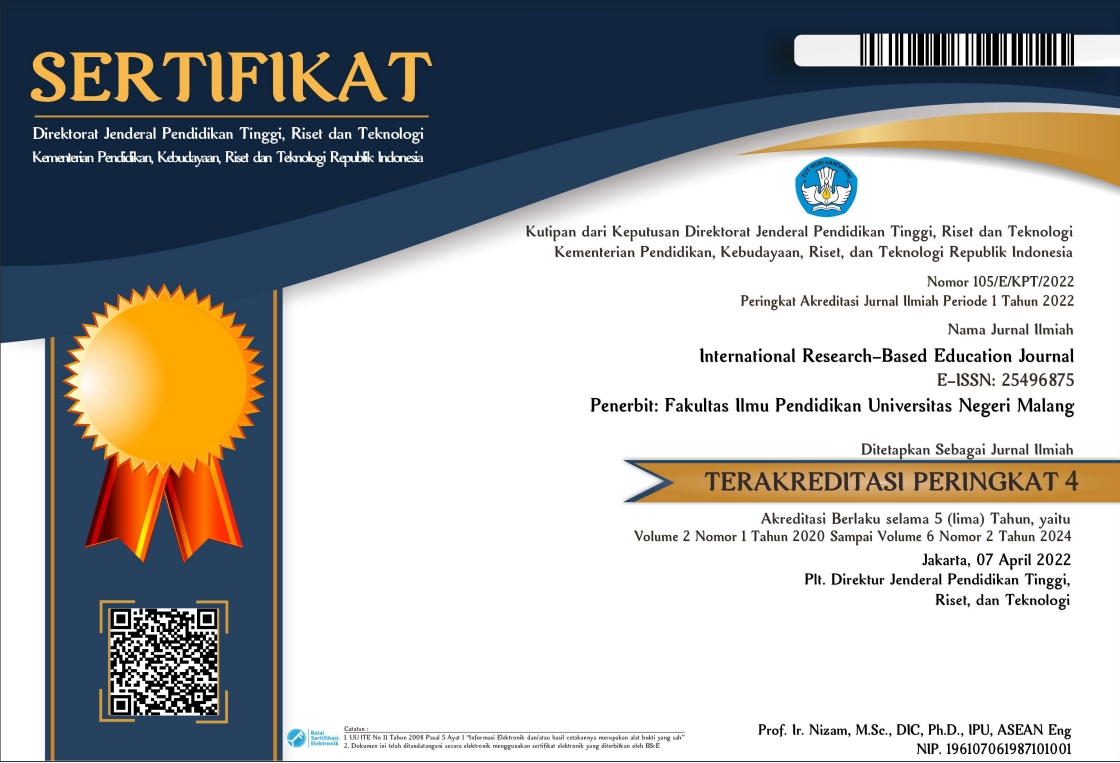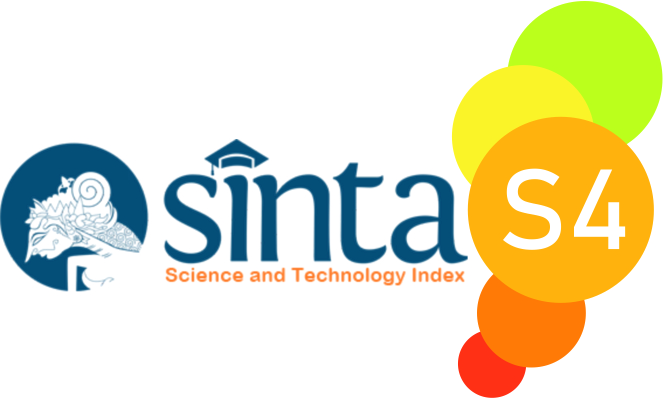INSTRUCTIONAL LEADERSHIP PROFILE OF JUNIOR HIGH SCHOOL’S PRINCIPAL (A Case Study of Junior High School in Malang)
Abstract
This study aims to determine the profile of instructional leadership shown by the Principal of Junior High School, Malang City. The experiment was conducted with a qualitative approach. The technique of collecting data used interview, observation, and documentation. Data was analyzed using an interactive model as proposed by Miles and Huberman. The results showed the profile of instructional leadership principals were: (1) the action according to the vision and mission of the school; (2) developing the curriculum according to the vision, mission, and objectives of the school; (3) develop schools towards learning organization; (4) work hard to achieve the success of the school as a learning organization; (5) creating a culture and school climate conducive to learning and innovative; and (6) manage learners in order to develop its capacity.
Keywords: instructional leadership, principal, junior high school
Keywords
Full Text:
PDFReferences
Aziz, Z., and Baba, S. 2011. Instructional Leadership Enhanced Creativity in Smart Classroom Activities. Procedia Social and Behavioral Sciences, 15: 1566-1572, retrieved from http://www.sciencedirect.com.
Bafadal, I. 2016. Strengthening School Governance Through Preparation and Empowerment School Principal as the Instructional Leader. Proceedings the International Conference on Educational Management and Administration, Grand Clarion Hotel, Makassar, April 15-17.
Bulach, C., Boothe, D., and Pickett, W. 2006. Analyzing the Leadership Behavior of School Principals. National Council of the Professors of Educational Administration (NCPEA). Retrieved April, 26, 2015, from http://creativecommons.org/licenses/by/2.0/.
Cotton, K. 2003. Principals and Student Achievement. Alexandria: Association for Supervision and Curriculum Development (ASCD).
Darling-Hammond, L., LaPointe, M., Meyerson, D., Orr. M. T., and Cohen, C. 2007. Preparing School Leaders for a Changing World: Lessons from Exemplary Leadership Development Programs. Stanford, CA: Stanford University, Stanford Educational Leadership Institute.
Department of Education. 2005. What is Instructional Leadership and Why is it so Important? Retrieved April 25, 2015, from http://www.sedl.org/pubs/reading100/RF-NB-2005-Spring.pdf.
Dina, A. T. 2013. Challenges Faced by Educational Leadership on Influencing Student Learning. 3rd World Conference on Learning, Teaching and Educational Leadership (WCLTA-2012). Procedia - Social and Behavioral Sciences, 93: 290-295, retrieved from http://www.sciencedirect.com.
Farr, S. 2010. Teaching as Leadership: How Highly Effective Teachers Close the Achievement Gap. San Francisco: Jossey-Bass.
Glickman, C. D. 1980. Developmental Supervision: Alternative Practices for Helping Teachers to Improve Instruction. Alexandria: Association for Supervision and Curriculum Development (ASCD).
Glickman, C. D. 2002. Leadership for Learning: How to Help Teachers Succeed. Alexandria: Association for Supervision and Curriculum Development (ASCD).
Gunawan, I. 2015. Mengembangkan Kepemimpinan Kepala Sekolah Berbasis Nilai dan Etika. Proceeding National Seminar and International Conference Scientific Forum-Faculty of Education Department of Science Educatioin (FIP-JIP), Fakultas Ilmu Pendidikan Universitas Negeri Gorontalo, Gorontalo, 9-11 September.
Gunawan, I. 2016a. Merevitalisasi Kepemimpinan Pancasila dalam Bidang Pendidikan. Prosiding Seminar Nasional Penguatan Manajemen Pendidikan di Era Kompetisi Global, Jurusan Administrasi Pendidikan Universitas Negeri Malang, Malang, 12 Maret.
Gunawan, I. 2016b. Model of Educational Leadership in the Implementation of Curriculum 2013. Proceedings the 4th International Conference Language, Society, and Culture in Asian Contexts (LSCAC 2016) on Cultivating and Casting Asian Diversities: Empowering the Asians, Hotel Atria, Malang, May 24-25.
Hallinger, P. 2005. Instructional Leadership and the School Principal: A Passing Fancy that Refuses to Fade Away. Leadership and Policy in Schools, 4: 1-20.
Hallinger, P., and Heck, R. 1996. The Principal’s Role in School Effectiveness: A Review of Methodological Issues. In Leithwood, K., (Ed.), The International Handbook of Educational Leadership and Administration (p. 723-784). Dordrecht, Netherlands: Kluwer.
Hallinger, P., and Heck, R. H. 1998. Exploring the Principal’s Contribution to School Effectiveness: 1980-1995. School Effectiveness and School Improvement, 9: 157-191.
Hallinger, P., and Heck, R. 2002. What do You Call People with Visions? The Role of Vision, Mission and Goals in School Improvement. In Leithwood, K., (Ed.), The Second International Handbook of Educational Leadership and Administration. Dordrecht, The Netherlands: Kluwer.
Heck, R. H. 1992. Principals’ Instructional Leadership and School Performance: Implications for Policy Development. Educational Evaluation and Policy Analysis, 14: 21-34.
Hoerr, T. R. 2005. The Art of School Leadership. Alexandria: Association for Supervision and Curriculum Development (ASCD).
Jita, L. C. 2010. Instructional Leadership for the Improvement of Science and Mathematics in South Africa. Procedia Social and Behavioral Sciences, 2: 851-854, retrieved from http://www.sciencedirect.com.
Leithwood, K., Seashore-Louis, K., Anderson, S., and Wahlstrom, K. 2004. How Leadership Influences Student Learning (Learning from Leadership Project Executive Summary). New York: The Wallace Foundation.
Leithwood, K., and Duke, J. 1999. Transformational School Leadership Effects: A Replication. School Effectiveness and School Improvement, 10(4): 451-479.
Leithwood, K., Louis, K. S., Anderson, S., and Wahlstrom, K. 2004. Review of Research How Leadership Influences Student Learning. Minnesota: Center for Applied Research and Educational Improvement (CAREI).
Loeb, S., and Horng, E. 2010. New Thinking about Instructional Leadership. Retrieved January 12, 2016, from http:// journals. sagepub. com/ doi/ pdf/10.1177/003172171009200319.
Lunenburg, F. C. 2010. The Principal as Instructional Leader. National Forum of Educational and Supervision Journal, 27(4): 23-30.
Malkki, H., and Paatero, J. V. 2015. Curriculum Planning in Energy Engineering Education. Journal of Cleaner Production, 106: 292-299.
Miles, M. B., and Huberman, A. M. 2014. Qualitative Data Analysis: A Methods Sourcebook. New York: SAGE Publications, Inc.
Mirkamali, S. M., Thani, F. N., and Alami, F. 2011. Examining the Role of Transformational Leadership and Job Satisfaction in the Organizational Learning of an Automotive Manufacturing Company. International Conference on Education and Educational Psychology (ICEEPSY 2011), Procedia - Social and Behavioral Sciences, 29: 139-148, retrieved from http://www.sciencedirect.com.
Portin, B., Alejano, C. R., Knapp, M. S., and Marzolf, E. 2006. Redefining Roles, Responsibilities, and Authority of School Leaders. Washington: Center for the Study of Teaching and Policy, University of Washington.
Sergiovanni, T. J. 2001. Leadership: What’s in it for Schools? London: Routledge Falmer.
Southworth, G. 2002. Instructional Leadership in Schools: Reflections and Empirical Evidence. School Leadership and Management, 22(1): 73-92.
Thomson, S. D. 1993. Principals for Our Changing Schools: The Knowledge and Skill Base. Virginia: National Policy Board for Educational Administration.
Wikipedia. 2016. Instructional Leadership. Retrieved August 18, 2014, from https://en. wikipedia. org/wiki/Instructional_leadership.
Yildirim, A., and Bastug, I. 2010. Teachers’ Views about Ethical Leadership Behaviors of Primary School Directors. Procedia Social and Behavioral Sciences, 2: 4109-4114, retrieved from http://www.sciencedirect.com.
Yilmaz, E. 2010. The Analysis of Organizational Creativity in Schools Regarding Principals’ Ethical Leadership Characteristics. Procedia Social and Behavioral Sciences, 2: 3949-3953, retrieved from http://www.sciencedirect.com.
Yucil, C., Karatas, C. E., and Aydin, Y. 2013. The Relationship between the Level of Principals Leadership Roles and Organizational Culture. 3rd World Conference on Learning, Teaching and Educational Leadership - WCLTA 2012. Procedia - Social and Behavioral Sciences, 93: 415-419, retrieved from http:// www. Science direct.com.
DOI: http://dx.doi.org/10.17977/um043v1i1p%25p
Refbacks
- There are currently no refbacks.

This work is licensed under a Creative Commons Attribution-NonCommercial-ShareAlike 4.0 International License.










1.png)



